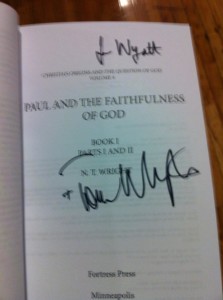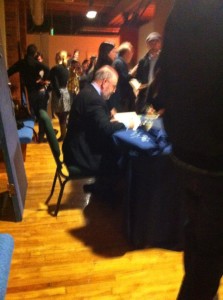

Wyatt: My name is Wyatt, I really enjoyed your book. There are many psalms that talk about trees clapping their hands and the hills rejoicing. In the west, we understand the covenant in terms of preservation of creation, but as Jesus learned about himself from the psalms and understood himself as the Cosmic Christ. It seems that there are implications that the gospel is for all people, all places, all animals, all stars. In what sense can you affirm that there is redemptive, more than preservation aspect to the psalms and the gospel, from your understanding of them?
N.T. Wright: I’m not sure got exactly what your question is. How much do the psalms point forward to the renewal of creation?
Wyatt: I’m asking in terms of universal redemption. Is there future for places and animals and land, other than merely stewardship of Creation in the West?
N.T. Wright: Yes, there are several quite big questions hiding beneath that one. But it is a very, very important issue. As I was trying to say, and develop what I said before down that line. In say Colossians chapter one, the great poem there, all things were created in, and through and for the Messiah, Jesus, and then in the second part of that poem “all things” are reconciled, and what are these “all things”? How does that work? It’s quite clear that Paul who is in prison when he is writing this, for goodness sake, is not saying, “Isn’t the world is a lovely place now, and because of Jesus all things in the garden is lovely.” There is a sense that the God who made this world, intends to remake it and what that will be like, is very, very difficult for us to say. All we have is a set of sign points, and I say in my book, Surprised by Hope, and all of our language about the ultimate future is a set of sign posts pointing into a fog. And we do not know how much these sign posts are symbolic. If you are driving down the road, certainly, in my country, and it is a foggy day, you could see sign posts sometimes with little symbols on them. If there’s a castle, there’s a little symbol like this, which means castle. And when you get there, you don’t grumble because that wasn’t actually a photograph of the castle, it is a symbol. And that’s fine, this is what sort of castle it is. And in the same way, our language about the future, like Revelation with the streets being paved with gold and that sort of thing, these are symbols which are pointing ahead, and they tells us as much as we can possibly know in the present of a future world, which is like the present one, but much, much more so. God has made this world powerful, beautiful, extraordinary, tender and delicate. And all of that, it seems to be, we are promised in Scripture, will be enhanced. So that the language of Universal Salvation is difficult, because the bible makes it quite clear in many, many places that it is possible for humans actually to say no. And that’s a whole other debate as to how that works and what that means. But it seems to be clear to me in the Psalms, we are already celebrating in the present. Again, I go back to [Psalm] 96 and 98 and many others as well. What God has promised to do with the future. I would couple with that Isaiah 55, the end of Isaiah 55 is a spectacular bit about the powerful word of god which will do the new Creation thing, so that instead of thorn will come up the myrtle, instead of the briar, the cedar, and so on. This is the reversal of the curse of Genesis 3, it is the reversal of the curse on vineyard in Isaiah 5. It’s a way of saying God will do the world the he always intended and wanted to do, and the means by which he will do it, is by rescuing his people, the whole sequence and thought of Isaiah at that point.



March 9th, 2015 - 05:18
At this time it sounds like Drupal is the preferred blogging platform available right now.
(from what I’ve read) Is that what you are using on your blog?